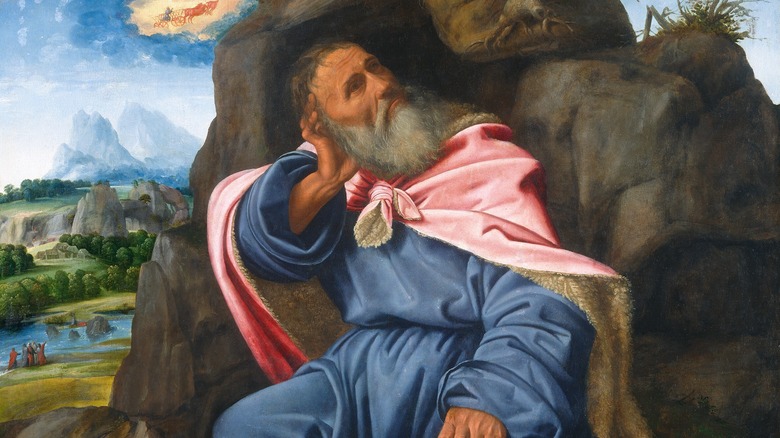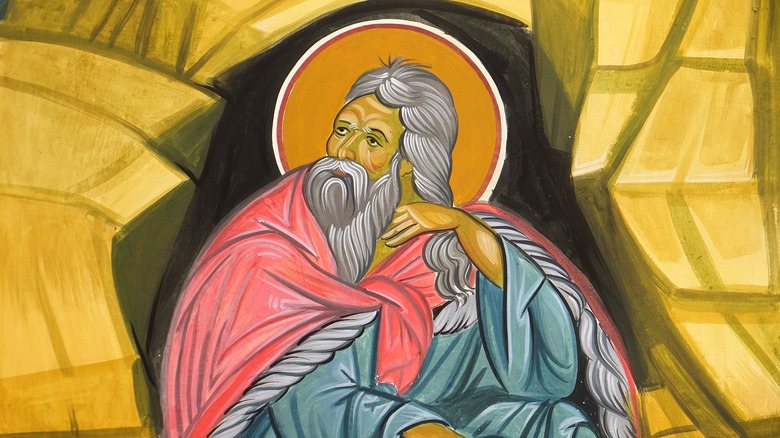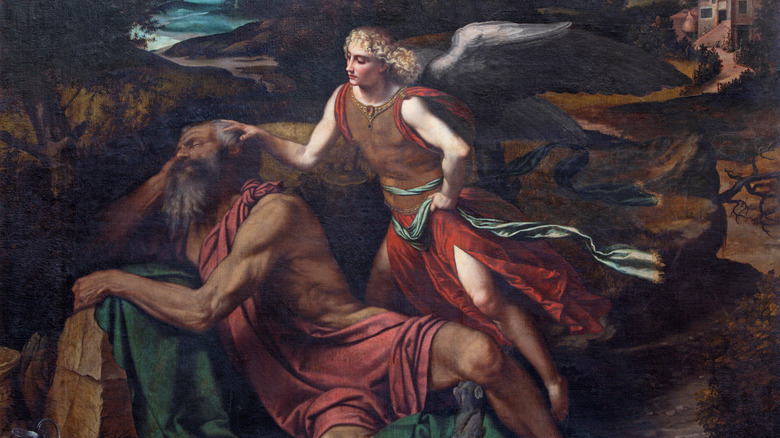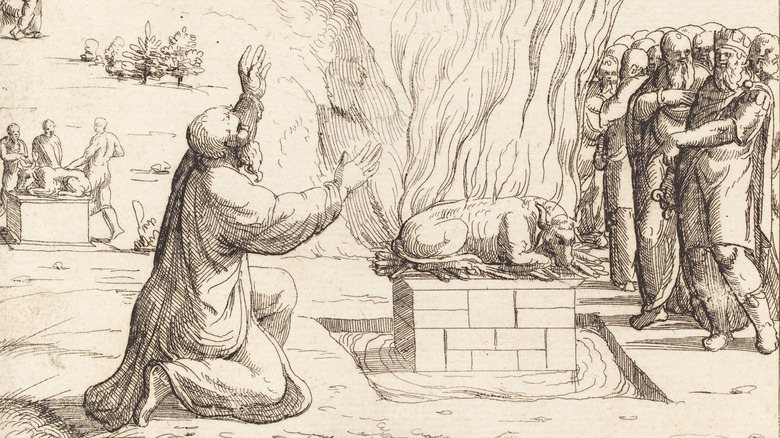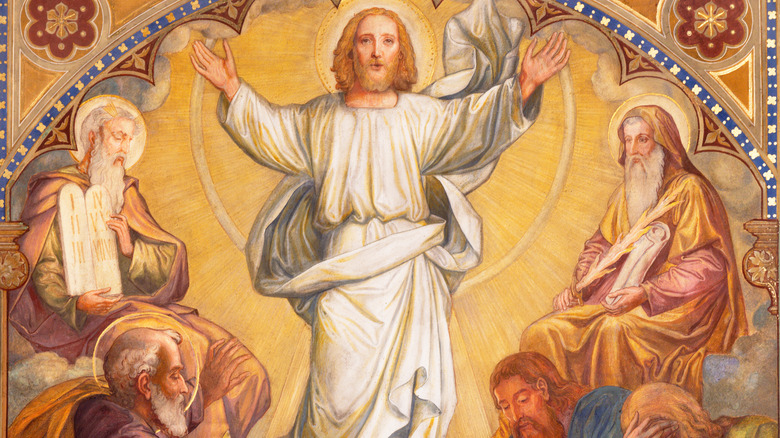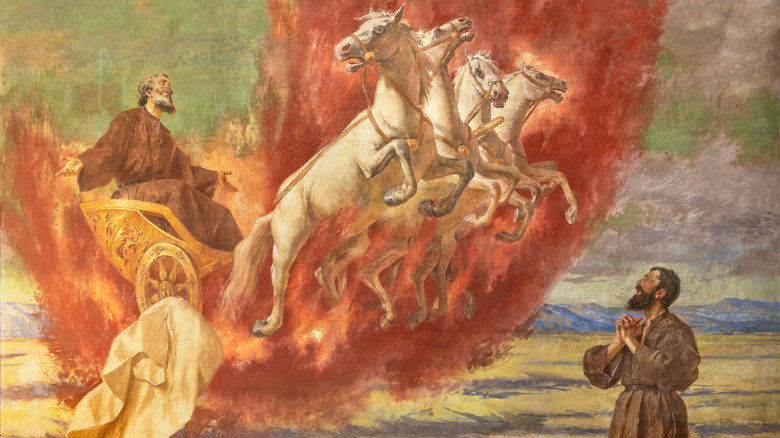The Untold Truth Of Elijah From The Bible
One of the key figures in the Old Testament, and definitely one of the key prophets in the text, Elijah appears out of nowhere in the narrative right when he's needed the most. He ministers for a while, does God's work, and where needed demonstrates God's power when opposing an evil regime at great risk to himself (via Got Questions). He then departs from the narrative as quickly and abruptly as he entered it.
Though he's only in the text for a few pages, the significance of the prophet Elijah in the narrative of God's revelation in history cannot be discounted. His name comes up again in the New Testament, both as theological context for Jesus' ministry and in an event involving Jesus and Elijah directly. His life and ministry serve as a cautionary tale for those who would do God's work today: an example of the importance of obeying God's directives at any and all costs, and for trusting God to get the job done when the person doing the work is doubtful and disheartened.
Elijah ministered during a dark time
Elijah first appears in the Old Testament narrative in 1 Kings 17. At the time, Israel was ruled by an evil king, Ahab, who, along with his wife, Jezebel, forbade the worship of God in the land and instead ordered the worship of Baal. So wicked was Ahab's reign that the Bible describes his and Jezebel's persecution of God's prophets in great detail, as well as the installations of an idol to worship Baal in a temple that had been built for God and an idol to another god, Asherah, as described in 1 Kings 16.
Elijah first comes up in the narrative when God sends him to warn King Ahab about an upcoming drought and famine. He simply appears in the first sentence of the chapter, absent any information about his origin or family, and is sent to tell the wicked king, "As the Lord, the God of Israel, lives, whom I serve, there will be neither dew nor rain in the next few years except at my word."
That ongoing drought and famine would form the basis for key points of Elijah's upcoming ministry.
Elijah was forced to rely on God
Within a paragraph of Elijah warning that a drought and famine would be coming, the narrative places the reader in the midst of the worst of it. Elijah, facing persecution and starvation, hides in caves while he gets provisions from ravens and water from a nearby brook. However, once the brook dried up, God commanded the prophet to go to a widow and ask her for food. There, the narrative describes the woman as nearing starvation herself. As Elijah asks her for bread, the widow tells him that she's gathering sticks for a fire to make her last meal, which she and her son will eat and then die. However, Elijah promises a miracle. If she feeds him, then her jars of flour and oil would never run dry as long as the famine continued — and that's exactly what happened, as recorded in 1 Kings 17.
According to Christian question-and-answer column Got Questions, this and similar stories in the Elijah narrative are examples of the importance of total reliance on God and obedience to his will. "He fulfills all of our needs, and His mercy to us never runs short," the writer notes.
Elijah's participation in a battle of the gods
One of the key events in Elijah's ministry, indeed, the event that triggered the end of the famine that had bedeviled the land while he prophesied, occurs in 1 Kings 18. In this narrative, Elijah and the prophets of Baal agree to have a contest of sorts to see whose god is the true god. The competitors decide to place a bull atop an altar and call upon their god to consume it by fire, with Baal's prophets going first. For hours, the pagan priests pray, cry, even maim themselves, all while Elijah taunts and nothing happens. Then, on Elijah's turn, he orders not only a bull atop the altar, but trenches are dug and then filled with water — a powerful statement, considering that there was a drought and every drop was precious beyond measure. On Elijah's command, fire consumed the bull and every last drop of water. Then, the skies opened up and rain fell on the land, ending the drought.
That was not the end of Elijah's ministry, however. He has a few more adventures before he leaves the narrative, not by dying, but by being taken up to Heaven in a whirlwind, as described in 2 Kings 2.
Elijah spoke with Jesus in the New Testament
Elijah, like Moses and Solomon and a small handful of others, is one of the men mentioned in both the Old and New Testaments. Jesus mentions him several times when speaking to his listeners, and at times, he was confused for perhaps being a reincarnation of the prophet (for example, in Mark 6).
Elijah also appears in the New Testament not figuratively, but literally, in an event now known as the Transfiguration. Specifically, Matthew 17, Mark 9, and Luke 9 all record the same basic story: Jesus and his disciples went to a mountain and there, Jesus was transfigured to the point where he shone like the sun. He was then joined by Moses and Elijah, who talked things over with him, before the event concludes by God decreeing that Jesus is his son. As Dorothy Lee writes in her book, "Transfiguration," the event symbolizes the finite meeting the eternal, with Jesus acting as a sort of bridge between Heaven and Earth.
Elijah remains important in Judaism and Islam
As a key figure in the narrative in the Old Testament, Elijah, like Abraham and a small number of others, comes up not just in the Bible, but in the Quran. Specifically, according to Islamic Online Educational Platform, he's mentioned twice in the holy text of Islam, as a prophet of God who opposed King Ahab the adulterer. Further, according to some Islamic traditions, Elijah being taken up into Heaven did not signify his death, and that he is still alive somewhere, as Mehmet Dikmen notes in Questions on Islam.
Elijah is also an important figure in Judaism to this day. As Haggadot explains, during the Passover celebration, Jews traditionally set a place at their table, pour a cup of wine, and leave the door open for Elijah. "Elijah is the peacemaker in a world of strife and discord. Opening the door for Elijah is a harbinger of the future redemption to come," author Eric Schiffer notes.
